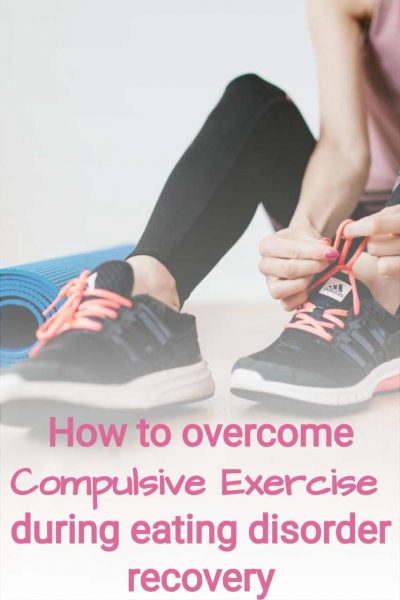How to deal with compulsive exercise in eating disorder recovery
By Tanja, Psychologist for Eating Disorders & Body Image

Do you exercise to compensate for overeating or just eating? Do you judge a day as “good” or “bad” depending on how much you exercise? Do you get anxious or angry when you can’t exercise? Or do you sometimes wish you could stop exercising but you can’t? If this sounds familiar to you, it might indicate that your exercise behaviour has gone too far.

Hi there!
I’m Tanja. I’m a qualified psychologist specialising in eating disorders, negative body image and body hate. I’m also a survivor of anorexia.
My mission is to help you to end your lifelong struggles with food and your body and inspire you to uncover and embrace you true worth. Read more…
In fact, compulsive exercise in eating disorder recovery is one of the most common recovery sabotage behaviours. This is not surprising, as compulsive exercise in eating disorder recovery is easy to justify because exercise is generally good for our health.
On the other hand, most people would understand vomiting, laxative abuse, food rules or excessive use of the body scale as eating disorder behaviours, but would be surprised that exercise can be such a behaviour.
For some people with eating disorders and for those who are in recovery, the healthy concept of daily exercise is taken to the extreme – too much of a good thing can be bad too.
Join the Body Acceptance & Food Freedom Collective
Receive a weekly dose of inspirations to help you make peace with your body and food.
Don’t worry, we hate spam too. You can unsubscribe any time.
Categories
Anorexia
Binge Eating Disorder
Bulimia
Intuitive Eating
Mindfulness
Orthorexia
Strategies for Recovery
Signs of compulsive exercise in eating disorder recovery
Bulimia isn’t the only eating disorder where compulsive exercise shows up. Even people who suffer from anorexia or orthorexia exercise compulsively to increase weight loss or to avoid weight gain.
How do you know if you are sabotaging your eating disorder recovery through compulsive exercise behaviours?
In short, you are a compulsive exerciser when your exercise is no longer an option and is mandatory for you. Despite the negative physical, emotional and social consequences, you are unable and afraid to slow down or stop your exercise behaviours.
Here are some further signs of compulsive exercise in eating disorder recovery:
- I base my self-esteem on how much I exercise.
- I never take a break from exercise, no matter what injury, illness or discomfort I suffer.
- I organise work and other social activities around exercise and if necessary, I cancel social engagements to exercise.
- I feel stressed, anxious or guilty when I can’t exercise.
- I’m rarely satisfied with the exercise I have done.
- I use exercise to compensate for the food I have eaten.
If any of the statements above apply to you, reconsider your compulsive exercise behaviours, so that it doesn’t interfere with your eating disorder recovery.

Problems with compulsive exercise in eating disorder recovery
Compulsive exercise in eating disorder recovery is always dangerous. Even for a healthy person, over-exercising is bad for their body. However, if you suffer from an eating disorder, the combination of food restriction and compulsive exercise is even more harmful. Due to a lack of food intake, your body doesn’t have enough energy to exercise.
So how is your body still able to exercise? It breaks down proteins from your muscles to use them as energy.
What does this mean? Fewer muscles means less metabolism. Spending all your body’s energy on exercise when this energy is needed for brain and organ functions, hair growth and bone development is very harmful and dangerous. When your body doesn’t have enough energy, your bones will become weak and break down, resulting in stress fractures and other injuries.
Too much exercise and not enough food leads to low hormone levels, which is also linked to low bone density and even an end to menstruation. Your body shuts down some of its functions when it doesn’t get the amount of energy, which is necessary to sustain the amount of exercise being undertaken.
It is already harmful not to nourish your body adequately, but it is even more harmful and dangerous when you engage compulsive exercise in eating disorder recovery.
How to overcome compulsive exercise in eating disorder recovery
If you find yourself struggling with compulsive exercise in eating disorder recovery, rest assured that there are several steps you can take to help you to let go of your compulsive exercise. For instance:
- Gradually reduce your exercise time. For example, decrease the length by 5 to 10 minutes for each workout;
- Change the type of exercise. For example if you run, you could replace this with yoga, pilates or walking;
- Reduce the number of days you exercise;
- Set official start and stop times and commit to stick to these times;
- Stop exercising completely until it is safe to do it again;
If you are honest with yourself, you will likely agree that compulsive exercise in eating disorder recovery helps you deal with feelings, stay in control and maintain your self-esteem. Also, you probably take great pride in your self-discipline, which allows you to push yourself to the absolute limit.
But what is harder for you – to exercise or not? The latter is probably more difficult. Isn’t limiting or stopping your exercise to protect your health the most impressive sign of willpower and self-discipline?
It is entirely possible to overcome an eating disorder or body hate – I have done it, others have done it and so can you!
Join the Body Acceptance & Food Freedom Collective
Receive a weekly dose of inspirations to help you make peace with your body and food.
Don’t worry, we hate spam too. You can unsubscribe any time.
You Might Also Enjoy...

Hi there!
I’m Tanja. I’m a qualified psychologist specialising in eating disorders, negative body image and body hate. I’m also a survivor of anorexia.
My mission is to help you to end your lifelong struggles with food and your body and inspire you to uncover and embrace you true worth. Read more…



